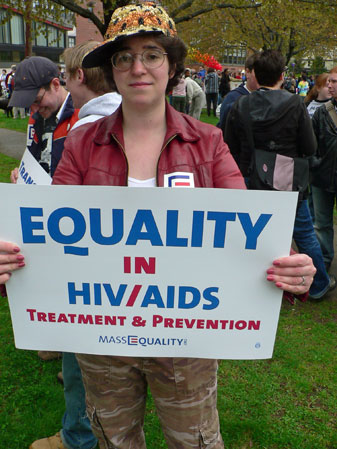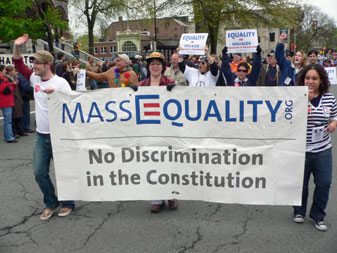Kristina LaCelle-Peterson’s Liberating Tradition: Women’s Identity and Vocation in Christian Perspective offers a solid introduction to Christian feminism, and a wake-up call to the churches not to mistake culturally conditioned gender roles for gospel truth. Topics surveyed include the strong women of the Bible and their often-overlooked successors, from the female monastics to the 19th-century social reformers; feminine metaphors for God in Scripture; sex discrimination and body image; the diverse forms that marriage has taken in the Judeo-Christian tradition; and the egalitarian message of Jesus.
While at times I feel that Liberating Tradition goes in too many directions at once, this smorgasbord may be useful to conservative Christians who have not previously been exposed to basic feminist critiques of consumerism, for example. The book’s main strength is that LaCelle-Peterson backs up mainstream feminist-egalitarian arguments with detailed Biblical citations and historical evidence of women’s leadership roles in the church.
I was encouraged to see this book being sold at the recent Wheaton College theology conference, on the table of Baker Books, a leading evangelical publisher. As egalitarian perspectives become more reputable in evangelical circles, space also opens up for a more dynamic, historically aware method of reading Scripture, which hopefully can benefit other marginalized groups. It’s no longer plausible to say that we must replicate the family structures of first-century Palestine or else we’re undermining the authority of the Bible. Educated, active, Spirit-filled women, in numbers too great to ignore, are forcing the church to recognize that history and personal experience must inform our interpretive process, which means that our understanding of what the Bible says about women will change over time.
LaCelle-Peterson distinguishes herself from secular feminists and Christian complementarians, both of whom see the Bible and feminism as inherently incompatible. Instead, she argues that the Bible as a whole affirms women’s full humanity and equal participation in God’s kingdom. She does not take the liberal approach of throwing out texts that offend her politics, but rather contextualizes them and asks whether the “obvious” interpretation merely seems so because of the sexist cultural lenses through which we read.
God’s maleness, for instance, is not evident from Scripture. Compared to the other gods of the ancient Near East, who all had consorts and fertility rituals, the God of the Old Testament is strikingly non-gendered. Why do we assume that God is a literal “father” when this metaphor appears, but have no trouble perceiving the figurative language when God is compared to a stream of water, a rock, a nursing mother or a brooding hen? Since the God of the creation story transcends gender, “made in God’s image” applies equally to men and women.
After the Fall, hierarchy is introduced into the male-female relationship, with elements of oppression and unhealthy craving. Again, Christians have easily recognized that the other aspects of Adam and Eve’s new situation are a curse to be alleviated: “Are the items in Genesis 3 describing the state in which God wants us to live? For example, since God said farming would be difficult, does that mean using tractors is contradicting God?…Is it wrong for a woman to have epidural anesthesia in childbirth, since God said that women will have increased pain as they bear children?” (p.40) By contrast, we take Adam’s rule over Eve to be a moral norm, not a warning that their sin now taints all intimate relationships with the possibility of abuse of power.
In Jesus’ earthly ministry, we see God’s original plan for an egalitarian kingdom. Jesus validated Mary the sister of Martha when she assumed the posture of a male disciple, and provocatively ignored the purity taboos that would have kept him from healing, touching and speaking with women.
In a section titled “Discipleship Trumps Gender Roles”, LaCelle-Peterson adds, “It is interesting that Jesus also refuses to affirm positive traditional roles for women, even when asked to. Most significantly, unlike the tradition of some sectors of the Christian church, he does not put his own mother on a pedestal and value her simply for having borne him.” (pp.58-59) In Mark 3:33-35 (“Whoever does the will of God is my brother and sister and mother”) he takes an exclusionary status marker, one’s membership in a family, and makes it open to all who follow God. Women who fulfill traditional expectations as wives and mothers are no more privileged than their widowed, poor, or unpartnered sisters, including those with a checkered sexual history. Similarly, in Luke 11:27, Jesus proclaims that anyone, through discipleship, can be on a par with the woman who gave birth to him. “He isn’t putting Mary down, but raising the status of all the women in the crowd.” (p.59)
LaCelle-Peterson takes on the verses in the Epistles that seem to limit women’s participation, such as 1 Cor 14:33-35 (“women should be silent in the churches”). She notes that these lines occur within a discussion of how both men and women should behave decorously when they pray and prophesy, so that non-Christians will not be scandalized. It is assumed that women will be preachers and teachers (e.g. Phoebe and others in Romans 16). As many scholars now believe, 1 Cor 14 probably refers to women in the congregation who talked during the service, perhaps asking their husbands to explain the Scriptures, since women were not generally literate.
LaCelle-Peterson suggests that 1 Tim 2:11-15 (“…I permit no woman to teach or hold authority over a man…yet she will be saved through childbearing”) addresses a specific problem: female followers of Diana or other mother-goddesses who were proclaiming their superiority to men within the church. Saved “through” childbearing does not mean “by” (as in, salvation comes through being a mother) but “during”; God will bring them safely through childbearing, so they no longer need to hedge their bets by praying to Diana.
Anyone who’s cringed at the selection of pastel-tinted “Christian womanhood” books in a Lifeway bookstore, or sat through one too many John Eldredge lectures on how men naturally long to be rescuers and women to be rescued, will appreciate LaCelle-Peterson’s deconstruction of gender stereotypes that have been picked up by the evangelical marketing machine and reinforced with so-called divine authority. Consumer culture teaches young girls that their self-worth depends on being pretty, delicate, and unthreatening. Gimmicks like Revolve, the Bible packaged as a teen fashion magazine, misdirect Christian girls’ energy toward externals rather than internal spiritual maturity. It would be funny if it wasn’t so dangerous.
One of the most helpful sections of this book is its tour through the many manifestations of marriage in Biblical times and beyond. What Christian conservatives call the “traditional” family, with the man working outside the home and his wife staying home to raise the children, is an artifact of 19th-century capitalism. Before industrialization, husbands, wives and children often worked side by side on the farm or in the artisan’s workshop. Both parents were involved in teaching the children the skills they would need to carry on the business.
However, when capitalism turned men into salaried employees of a large corporation, women’s non-cash-based labor became devalued and invisible. It was a sign of upward mobility if your wife could afford to stay home. This meant that the woman became an ornament to the male ego rather than a contributor to society. That pride-based arrangement doesn’t sound like the model of mutual submission we read about in the Epistles, still less the actual patterns of discipleship in the early church. Yet today’s conservative churches have uncritically
adopted a commercialized vision of gender roles as if it were based on natural law.
To me this suggests the dangers of an ahistorical reading of the Bible. Human beings are inescapably embedded in history, both enriched and constrained by the specifics of our time, place, and material interests. When we are afraid to contextualize and move on from the social arrangements that happened to prevail in New Testament times, because we are seduced by an impossible dream of an “objective” social order that stands outside historical contingency and fallibility, we also lose perspective on our present-day social arrangements and how they unconsciously shape our hermeneutics.
Liberating Tradition contains many more useful arguments from history and Biblical criticism than can be summarized in this review. By necessity, LaCelle-Peterson limits her focus to women’s heterosexual relationships and church leadership roles, but the logical extension of her critique of gender is unavoidable. Having admitted, in any context, that the meanings of maleness and femaleness are historically variable — and having recognized that our fallen nature easily converts difference into inequality, contrary to the radically inclusive vision of Jesus — we cannot honestly say “marriage is between one man and one woman” without admitting that most of the important words in that sentence are ambiguous, including (pace Bill Clinton) “is”. Will the female pastors and theologians in today’s conservative churches, who owe their leadership roles to feminist readings of the Bible, speak out against heterosexist idolatry, or will they pull the ladder up after them?





